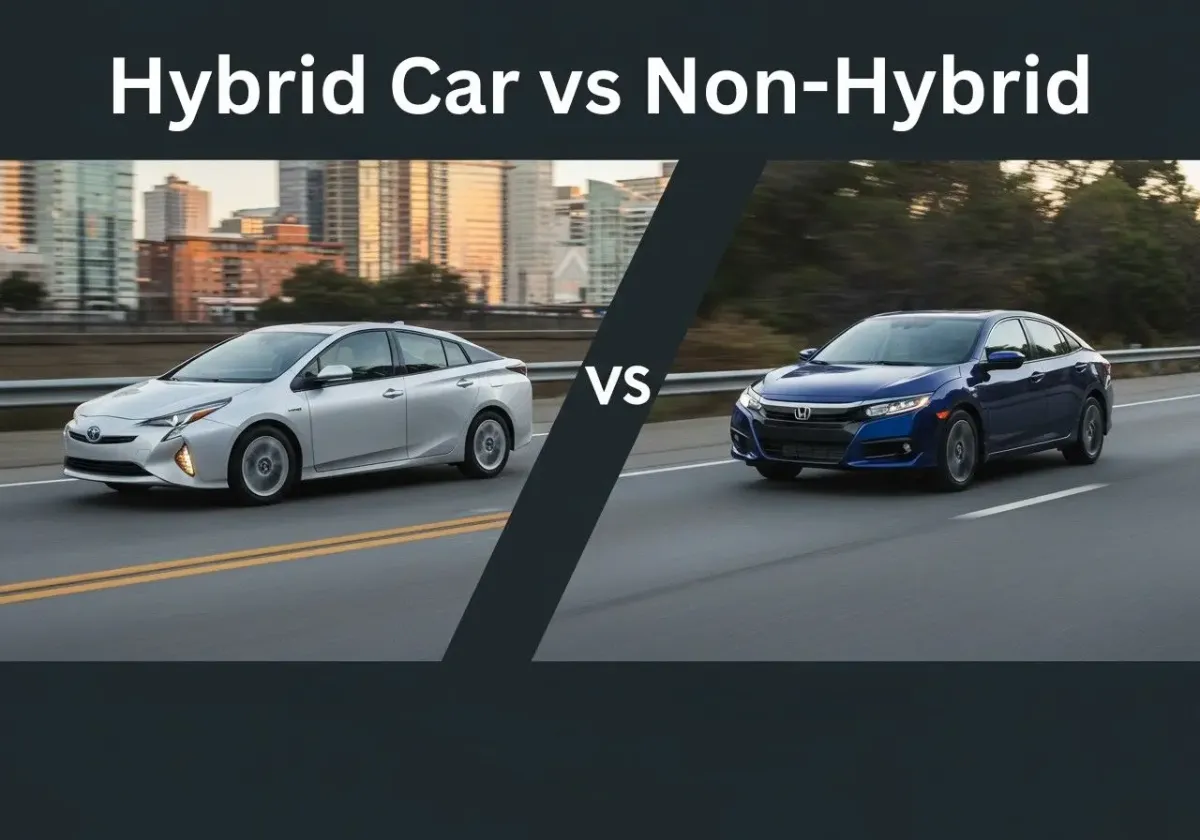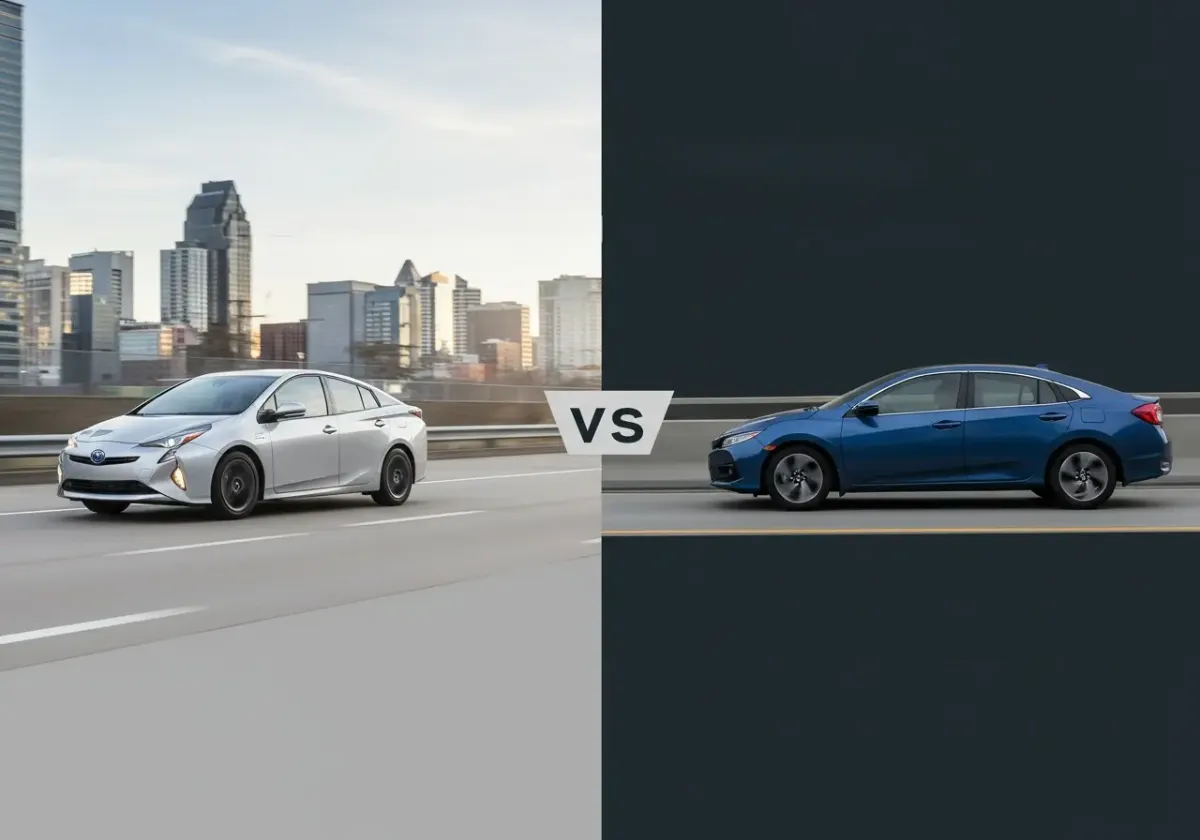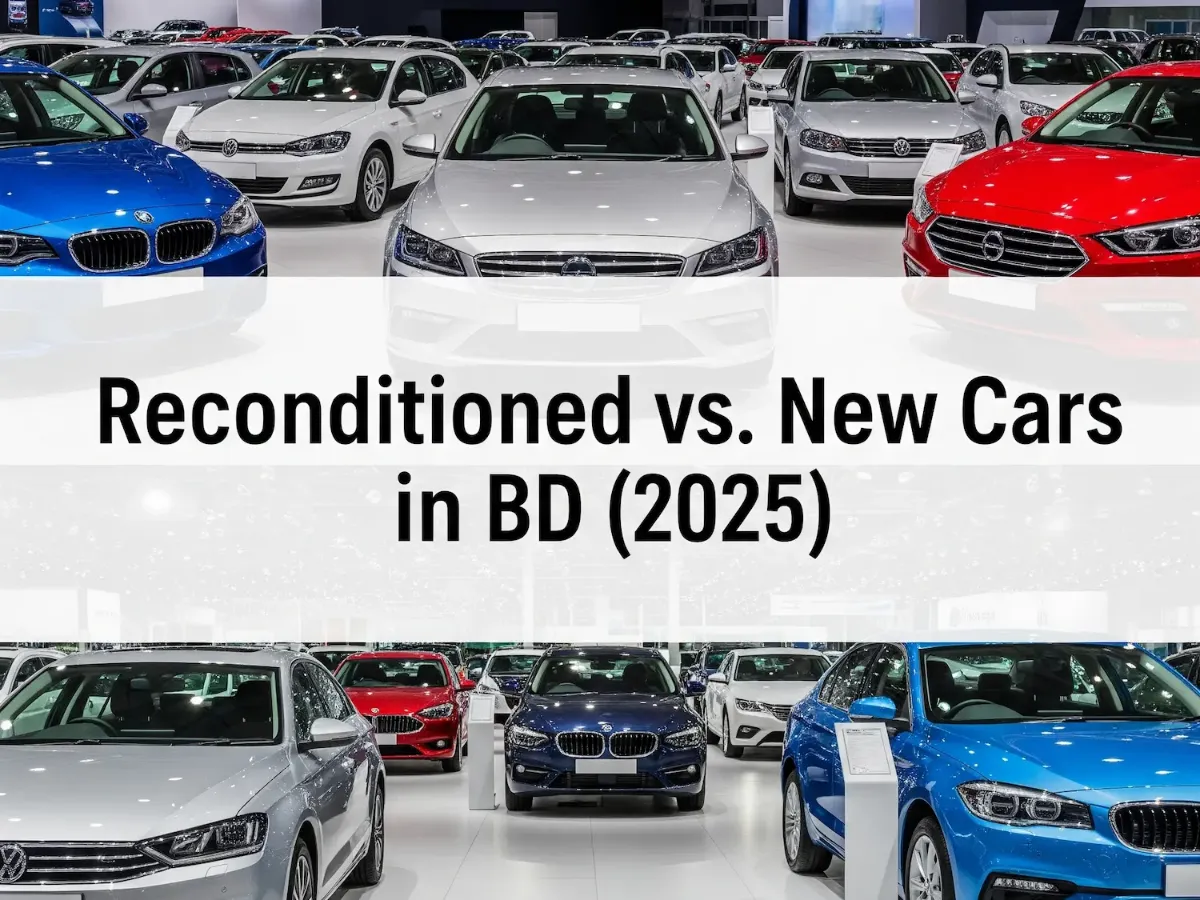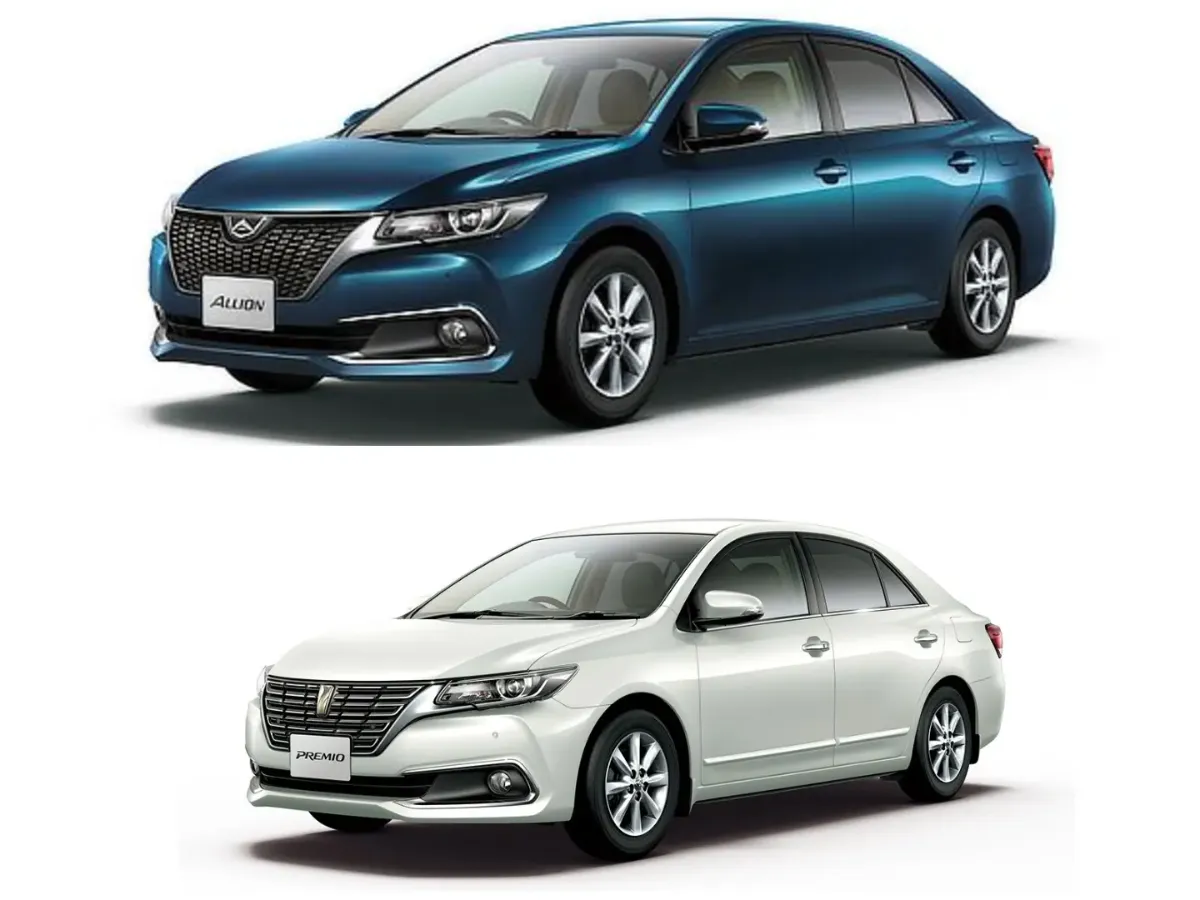HYBRID VS NON-HYBRID CARS: COSTS, PROS, CONS, AND BUYING GUIDE
`
Hybrid vs Non-Hybrid Cars: Clear Guide to Costs, Pros, and Fit
Choosing between hybrid vs non hybrid cars is easier when you match the car to your driving style and budget. A hybrid makes sense if most of your time is spent in city traffic. It uses both a gas engine and an electric motor, which means less fuel burned at low speeds and lower tailpipe emissions. If saving money at the pump and driving cleaner are your goals, a hybrid fits well.
A gas car (non hybrid) is the better choice if you want a lower purchase price, simpler maintenance, or you spend long hours on highways. In steady cruising, the advantage of a hybrid drops, so gas cars often deliver more value on open roads. They also handle towing and heavy loads better, making them practical for families and businesses.
Hybrid Car Meaning (What Does Hybrid Mean in a Car?)
The hybrid car meaning is simple: it’s a car powered by both a gasoline engine and an electric motor. These two systems work together, switching smoothly depending on the driving situation. In city traffic, the electric motor handles low-speed movement and stop-and-go driving, which saves fuel. On open roads, the gas engine takes over to provide steady power. This balance gives drivers better mileage and fewer emissions compared to gas-only cars.
A non hybrid car runs only on gasoline. Every trip, from idling in traffic to cruising on highways, depends fully on the engine. That makes them easier to maintain but less fuel-efficient, especially in busy cities.
So when we compare hybrid vs gas, the real difference is efficiency in traffic versus simplicity and lower upfront costs.

Hybrid vs Non-Hybrid Cars: Side-by-Side
When comparing gas vs hybrid cars, the real difference comes down to cost, efficiency, and how you plan to use the car. Below is a quick side-by-side look at the key points buyers ask about most.
| Feature | Hybrid Cars | Gas Cars (Non-Hybrids) |
|---|---|---|
| Purchase Price | Higher upfront due to added technology | Lower upfront, easier entry point |
| Fuel Economy | Excellent in city traffic; moderate gain on highways | Stronger on highways, less efficient in traffic |
| Maintenance & Repair | May require specialized service, more complex | Simple systems, easier to repair anywhere |
| Reliability | Proven in top brands, battery is main concern | Long track record, widely trusted |
| Emissions | Lower, eco-friendly in cities | Higher, all power from gasoline |
| Driving Range | Good overall, still depends on fuel tank | Long continuous range, no electric limits |
| Towing & Payload | Sometimes reduced due to extra weight | Handles heavier loads more easily |
| Resale Value | Often higher, strong demand in used market | Varies widely by model and fuel economy |
| Ownership Fit | Best for city drivers, eco-minded buyers | Best for highway drivers, budget buyers |
So, hybrid car vs non hybrid car why which is better? A hybrid wins in stop-and-go city driving, while a gas car fits better for highway travel, towing, or buyers watching initial costs.
Hybrid vs Gas Cars Pros and Cons
When buyers ask about hybrid vs gas cars pros and cons, the answer is best shown in two simple lists. Each option has strong points but also trade-offs that depend on where and how you drive.
Pros of Hybrid Cars
- Fuel efficiency in traffic – The electric motor cuts fuel use in stop-and-go driving.
- Lower emissions – Cleaner operation makes hybrids more eco-friendly in crowded cities.
- Quiet starts – Smooth and quiet at low speeds.
- Better resale demand – Many hybrids hold value because of fuel savings and growing demand.
Cons of Hybrid Cars
- Higher purchase price – Hybrids cost more upfront compared to non hybrid gas cars.
- Battery replacement risk – Outside warranty, battery repairs can be expensive.
- Specialized service – Repairs may need trained hybrid technicians.
- Less advantage on highways – Savings shrink during steady long-distance trips.
Pros of Non Hybrid Gas Cars
- Lower upfront cost – Easier to buy with a smaller budget.
- Simpler to maintain – Any workshop can handle routine service.
- Great for highway use – Stronger performance on long drives.
- Wide variety – Every size, trim, and price range is available in gas-only models.
Cons of Non Hybrid Gas Cars
- Lower fuel economy – Gas-only engines use more fuel in traffic.
- Higher emissions – All power comes from gasoline, which impacts the environment.
- Fuel costs can add up – Rising prices make daily use more expensive.
- Depreciation risk – Some models lose value faster than hybrids.
Looking at the pros and cons of hybrid vs gas cars, hybrids stand out for city commuters who value fuel savings, while gas cars remain the better fit for highway drivers and those looking for a lower purchase price. In short, hybrid cars vs gas cars pros and cons show that there’s no one “best,” only the right choice for your lifestyle.

Cost To Own: Hybrid vs Gas
The biggest question buyers ask about hybrid vs gas cars is how much they really cost to own. While hybrids save fuel, the price gap at purchase can make some people pause.
- Price gap at purchase – A hybrid usually costs more than a non-hybrid gas car because of the electric motor and battery system. That difference can be a few hundred thousand taka depending on the model.
- Monthly fuel spend – For city drivers stuck in traffic, a gas hybrid car can cut fuel bills by 20–40%. On highways, the gap is smaller because hybrids rely more on the gasoline engine.
- Service basics – Both hybrid and gas cars still need oil changes, filters, tires, and brakes. Hybrids may save on brake wear since regenerative braking takes some of the load.
- Battery warranty – Hybrid batteries are built to last and usually come with long coverage, often 8–10 years. This gives peace of mind that you won’t face sudden replacement costs early in ownership.
The right choice depends on your mix of city and highway driving. If most of your time is in traffic, the savings on fuel can cover the higher upfront price. For heavy highway drivers, a gas car may remain the cheaper option overall.
Driving Style Match: Pick Your Lane
The easiest way to decide between a hybrid car vs gas car is to match the vehicle to your daily driving style. Each option has its strengths, and choosing based on real use will save you money and stress later.
- City commute and heavy traffic → Hybrid
If you spend hours in stop-and-go traffic, a hybrid is the smarter choice. The electric motor handles low-speed driving, cutting fuel costs and reducing emissions. - Highway long trips and towing → Gas
For steady highway speeds or pulling heavy loads, gas cars perform better. They deliver consistent power and avoid the added weight of hybrid systems. - Tight budget buyer → Gas
If your top priority is the lowest purchase price, a non-hybrid gas car is the way to go. Upfront savings can be significant. - Eco-focused buyer → Hybrid
If lowering emissions matters most to you, hybrids are cleaner and more fuel-efficient in urban driving. - Rideshare or delivery → Hybrid
Drivers covering lots of city kilometers each week save the most with hybrids, thanks to better mileage.
In short, the gas vs hybrid cars decision is all about matching the car to your lifestyle.
Real-World Scenarios
The choice between hybrid vs non hybrid cars becomes clearer when you look at real driving habits. Here are three common situations buyers face.
- Daily Dhaka traffic commute → Hybrid advantage
For drivers stuck in city traffic every morning and evening, hybrids shine. The electric motor handles low-speed movement and stop-and-go conditions, which means lower fuel bills and fewer emissions. A gas-only car burns fuel the entire time, making it more costly in crowded streets. - Monthly long highway family trips → Gas advantage
Families who drive on highways for hours each month may prefer gas cars. At steady speeds, the benefit of a hybrid drops, while a gas engine provides consistent performance and longer range without the added cost of hybrid tech. - Mixed use, short city weekdays, light weekend trips → Either works
For drivers who spend weekdays in the city and weekends on light trips, both options make sense. In this case, comparing upfront cost versus long-term fuel savings is the best way to choose.
So, when comparing hybrid vs gas, your lifestyle is the real deciding factor.
Maintenance and Reliability
Both hybrids and gas cars need regular care. Oil changes, filters, tires, and brakes are routine for every vehicle. The main difference in hybrid vs gas maintenance is how the systems wear over time.
Hybrids often save on brake costs because of regenerative braking. This system uses the electric motor to slow the car, which reduces wear on traditional brake pads. Over years of city driving, that can make a noticeable difference.
That said, hybrids come with more advanced components. It’s smart to find a workshop trained in hybrid systems to handle diagnostics and battery checks. Gas cars, on the other hand, can be serviced almost anywhere with fewer specialized tools.
No matter which car you choose, keeping clean service records protects reliability and boosts resale value later. A full history shows buyers and dealers that the car has been cared for properly.
Book a Pre-Purchase Inspection
Resale Value and Demand
When comparing hybrid vs non hybrid cars, resale depends on fuel prices and local demand. In times of high fuel costs, hybrids often hold their value better because buyers look for savings. Gas cars can still sell well, but their resale price varies more by brand and model.
For both types, a clean ownership record is key. Keeping the auction sheet, service logs, and invoices proves the car’s condition and boosts buyer confidence. Dealers and private buyers pay more when they see proper documentation.
Tip: Store your auction sheet and service invoices together in one folder. It makes resale simple and helps you secure a stronger price later.
FAQ
What does hybrid mean in a car?
A hybrid car uses both a gasoline engine and an electric motor to power the vehicle, switching between them to save fuel.
How does hybrid vs gas save fuel in city traffic?
In stop-and-go driving, hybrids use the electric motor at low speeds, while gas cars burn fuel the entire time. This makes hybrids more efficient in city traffic.
Are hybrids worth it for long highway trips?
Not always. On highways, the gas engine does most of the work, so the fuel savings are smaller. A gas car may be more cost-effective for long-distance drivers.
Do hybrid vs non hybrid cars cost more to maintain?
Routine costs like oil, tires, and filters are similar. However, hybrids may need specialized service for the battery and motor, while non hybrid gas cars are simpler to maintain anywhere.
Do gas hybrid cars need charging?
No. Gas hybrid cars recharge their batteries automatically through driving and braking. There’s no need to plug them in.
Which holds value better, hybrid vs non hybrid cars?
Hybrids often hold value better when fuel prices are high. Non hybrids can sell well too, but their resale depends more on model and market demand.
Is there a simple hybrid car vs gas rule for buyers?
Yes. Hybrids are best for city driving and heavy traffic, while gas cars are better for highways, towing, and lower upfront cost.
`
OTHER ARTICLES

Reconditioned vs. New Cars in Bangladesh(2025) – Which One Should You Buy?

How to Maximize Your Car's Fuel Economy in Dhaka's Stop-and-Go Traffic

Car Loan in Bangladesh: 10‑Step Guide & Best Bank Rates

Toyota Premio vs Toyota Allion: Best Sedan Choice for Bangladeshi Buyers
